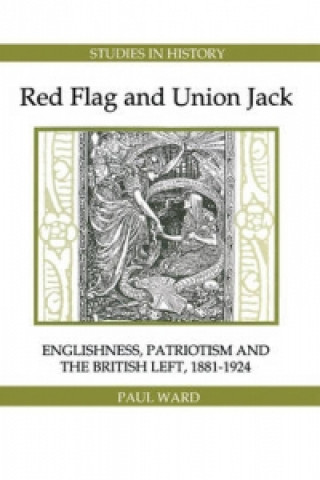
Kód: 04745431
Red Flag and Union Jack - Englishness, Patriotism and the British Left, 1881-1924
Autor Paul Ward
In the last third of the nineteenth century, the language of patriotism and national identity was appropriated by the political right. However, the British left did not give up ideas about patriotism and national identity after th ... celý popis
- Jazyk:
 Angličtina
Angličtina - Vazba: Pevná
- Počet stran: 240
Nakladatelství: Boydell & Brewer Ltd, 1998
- Více informací o knize

Mohlo by se vám také líbit
Informovat o naskladnění knihy
Zadejte do formuláře e-mailovou adresu a jakmile knihu naskladníme, zašleme vám o tom zprávu. Pohlídáme vše za vás.
Více informací o knize Red Flag and Union Jack - Englishness, Patriotism and the British Left, 1881-1924
 Anotace knihy
Anotace knihy
In the last third of the nineteenth century, the language of patriotism and national identity was appropriated by the political right. However, the British left did not give up ideas about patriotism and national identity after the emergence of socialism in the 1880s, which was rather presented as a restoration of an English past lost to industrial capitalism. This book traces the complex relationship between the British left and national identity in socialism's formative years, showing how some socialists used ideas of Englishness to legitimate their own form of socialism and to repudiate others, such as anarchism, syndicalism and Marxism, as 'foreign'. This Whiggish view of history was essentially English, yet many who held it were Scottish, Welsh and Irish, and they played a full role in creating a 'British socialism'. The First World War dealt a severe blow to radical patriotism. Pro-war sections of the labour movement were brought into the state, reinforcing their belief in parliamentarism and a consensual patriotism. The anti-war left continued to use radical patriotic language in the early years of the war, for example against the 'foreign yoke' of conscription, but the war degraded patriotism generally and the Russian Revolution gave internationalism a new focus. It also threatened the dominant concept of British socialism, and the post-war years saw a bitter debate over the forms of socialism. Moderate Labour, convinced that office could only be achieved on terms set by the British constitution, sought to prove their fitness to govern, and concentrated on the 'national interest' rather than oppositional Englishness. The left of the labour movement looked to soviet Russia rather than the English past for models for a future socialist society. The hold of radical patriotism on the British left was broken, but that of patriotism was not. It would take another world war to re-unite the two.PAUL WARD is lecturer in Modern British History at Royal Holloway College, University of London, and Visiting Lecturer at the University of Westminster.
 Parametry knihy
Parametry knihy
Zařazení knihy Knihy v angličtině Humanities History Regional & national history
- Plný název: Red Flag and Union Jack - Englishness, Patriotism and the British Left, 1881-1924
- Autor: Paul Ward
- Jazyk:
 Angličtina
Angličtina - Vazba: Pevná
- Počet stran: 240
- EAN: 9780861932399
- ISBN: 0861932390
- ID: 04745431
- Nakladatelství: Boydell & Brewer Ltd
- Hmotnost: 584 g
- Rozměry: 243 × 162 × 24 mm
- Datum vydání: 05. November 1998
Oblíbené z jiného soudku
-

Hundred Years' War on Palestine
356 Kč -

Ethnic Cleansing of Palestine
389 Kč -

History of Japan
402 Kč -

Ten Myths About Israel
353 Kč -

Strange Death of Europe
444 Kč -

Decline and Fall of the Roman Empire
143 Kč -

Secret History
303 Kč -

God's Playground A History of Poland
1699 Kč -

Mayflower
401 Kč -

How to be a Victorian
303 Kč -

Plantagenets
356 Kč -

General's Son
423 Kč -

Iran: A Very Short Introduction
282 Kč -

Temples of Karnak
3798 Kč -

Twenty Years A-Growing
249 Kč -

Cuneiform
276 Kč -

History of Witchcraft in England from 1558 to 1718
432 Kč -

China in Africa
906 Kč -

Bohemian Paris
415 Kč -

Islandman
276 Kč -

Lancaster And York
410 Kč -

Alexiad
440 Kč -

Inside Hitler's Greece
516 Kč -

Modern France: A Very Short Introduction
282 Kč -

Diana: Her True Story - In Her Own Words
303 Kč -

The Fourth Turning
476 Kč -

The Oxford History of Ancient Egypt
383 Kč -

Churchill: The Power of Words
384 Kč -

Palestine
574 Kč -

Korean History in Maps
705 Kč -

Great Gatsby (Wisehouse Classics Edition)
405 Kč -

Viking Way
1267 Kč -

The Thirteenth Tribe
309 Kč -

My Promised Land
389 Kč -

Vanished Kingdoms
542 Kč -

Age Of Revolution
410 Kč -

Life and Death of Anne Boleyn
584 Kč -

Coming of the Third Reich
463 Kč -

Children of Ash and Elm
487 Kč -

Europe Between the Oceans
798 Kč -

Socialism Betrayed
480 Kč -

303 Squadron
463 Kč -

Ancient Celts, Second Edition
655 Kč -

Dancing in the Glory of Monsters
400 Kč -

Battle of Britain: Luftwaffe Blitz (Images of War)
656 Kč -

Age of Confucian Rule
753 Kč -

Beyond Band of Brothers
410 Kč -

Benjamin Franklin
410 Kč -

On China
487 Kč
Osobní odběr Praha, Brno a 12903 dalších
Copyright ©2008-24 nejlevnejsi-knihy.cz Všechna práva vyhrazenaSoukromíCookies




 Vrácení do měsíce
Vrácení do měsíce 571 999 099 (8-15.30h)
571 999 099 (8-15.30h)